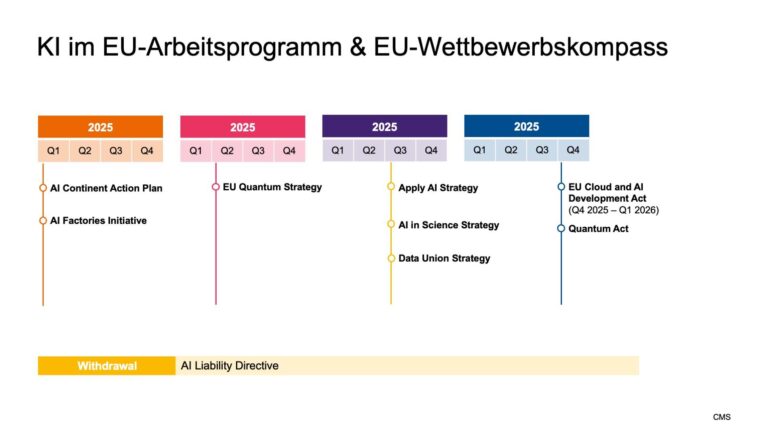The European Union is advancing a comprehensive new strategy aimed at curbing its dependence on American and Chinese technology in the rapidly evolving field of artificial intelligence. Announced in a bid to bolster the bloc’s technological sovereignty and competitiveness, the initiative seeks to foster homegrown innovation, enhance regulatory frameworks, and secure strategic partnerships within Europe. As global powers intensify their race for AI dominance, the EU’s move underscores a broader geopolitical push to assert control over emerging technologies critical to economic growth and national security.
EU Unveils Ambitious AI Framework to Strengthen Digital Sovereignty
The European Union has introduced a comprehensive regulatory framework designed to assert greater control over artificial intelligence development within its borders. This strategy aims to foster innovation while mitigating the bloc’s heavy dependence on dominant AI technologies from the US and China. Central to the initiative is the creation of a robust digital ecosystem that enhances data sovereignty and fuels the growth of homegrown AI startups. By prioritizing transparency, security, and ethical standards, the EU hopes to position itself as a global leader in responsible AI deployment.
Key objectives outlined in the framework include:
- Establishing common standards for trustworthy AI that respect user privacy
- Investing in research infrastructure and cross-border data sharing networks
- Encouraging public-private partnerships to accelerate tech innovation
- Strengthening cybersecurity defenses against foreign tech dominance
A comparative table highlighting strategic goals and targets illustrates the EU’s multi-faceted approach:
| Strategic Pillar | Target 2025 | Progress Indicator |
|---|---|---|
| AI Research Funding | €20 billion | €6 billion allocated |
| Data Infrastructure | 5 Pan-EU Data Spaces | 2 operational |
| Startups Supported | 1,000 new ventures | 450 registered |
| Regulatory Frameworks | Full implementation | Draft bills submitted |
Bridging the Innovation Gap The Union’s Plan to Boost Homegrown AI Technologies
The European Union is doubling down on its commitment to cultivate an autonomous AI ecosystem designed to lessen dependence on North American and Asian technology giants. By focusing on funding cutting-edge research, fostering collaboration between startups and established enterprises, and creating a regulatory framework that supports innovation while addressing ethical concerns, the Union aims to position itself as a global leader in artificial intelligence development. This multi-pronged strategy reflects a clear desire to nurture local talent and infrastructure, ensuring that European technologies not only compete globally but also align with the continent’s values of transparency and human-centric AI.
Key pillars of the plan include:
- Strategic investments in AI startups and research hubs across member states.
- Enhanced cross-border cooperation to avoid fragmentation of resources and policies.
- Establishment of a pan-European data infrastructure to ensure responsible access to quality datasets.
- Training programs to bridge the skills gap in AI-related fields.
- Clear legal guidelines to manage AI deployment risks and foster public trust.
| Focus Area | 2024 Budget Allocation (€ Billion) | Expected Outcomes |
|---|---|---|
| Research & Innovation | 3.2 | New AI prototypes and patents |
| Startups & SMEs Support | 1.5 | Boosted market entry and scalability |
| Skills Development | 0.8 | Trained AI professionals across sectors |
| Data Infrastructure | 2.0 | Improved access to high-quality datasets |
Policy Recommendations Focus on Collaboration Investment and Ethical Standards
The European Union’s newly proposed AI framework prioritizes multinational collaboration to nurture innovation within its borders. Key recommendations urge member states to pool resources and expertise, fostering cross-border research hubs that can both compete globally and reduce dependency on external technologies. Investment strategies highlighted in the policy include substantial public-private partnerships designed to accelerate AI development while ensuring equitable access across all regions of the bloc.
Ethical considerations are central to the strategy, with guidelines emphasizing transparency, accountability, and user privacy. The framework calls for the establishment of a pan-European AI ethics board that will oversee compliance and support the harmonization of ethical standards across industries. Below is a summary of the core policy pillars driving this initiative:
| Focus Area | Key Actions |
|---|---|
| Collaboration | Creation of transnational AI innovation networks |
| Investment | Increased funding for AI startups and infrastructure |
| Ethical Standards | Establishment of a unified European AI ethics regulatory body |
Closing Remarks
As the European Union advances its ambitious AI strategy, the bloc signals a clear intent to assert greater technological independence amid escalating global competition. By fostering homegrown innovation and regulatory frameworks tailored to its unique values, the EU aims to reduce reliance on dominant US and Chinese tech giants. The success of this initiative will be closely watched by industry stakeholders and policymakers alike, as it could reshape the balance of power in the rapidly evolving artificial intelligence landscape.




